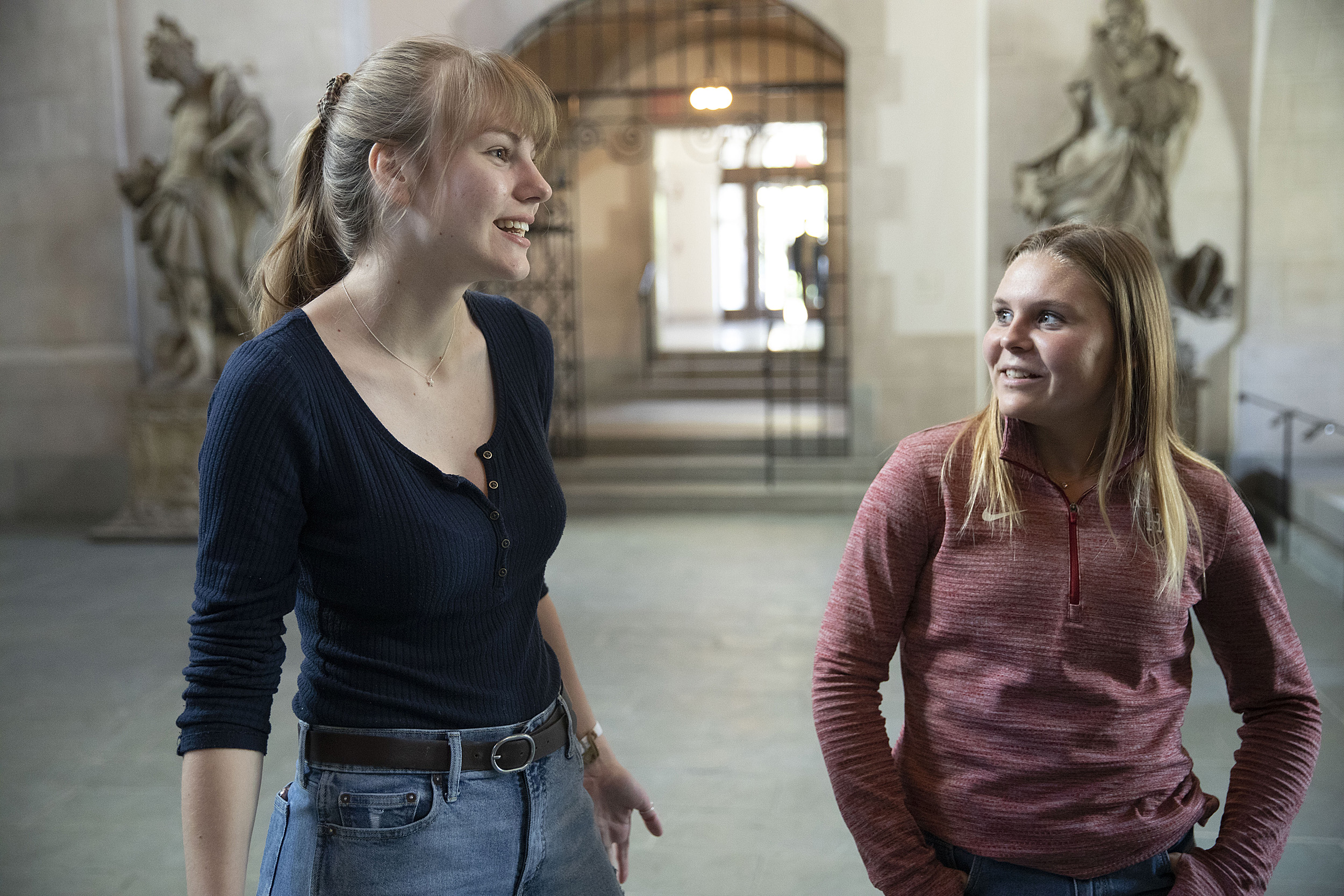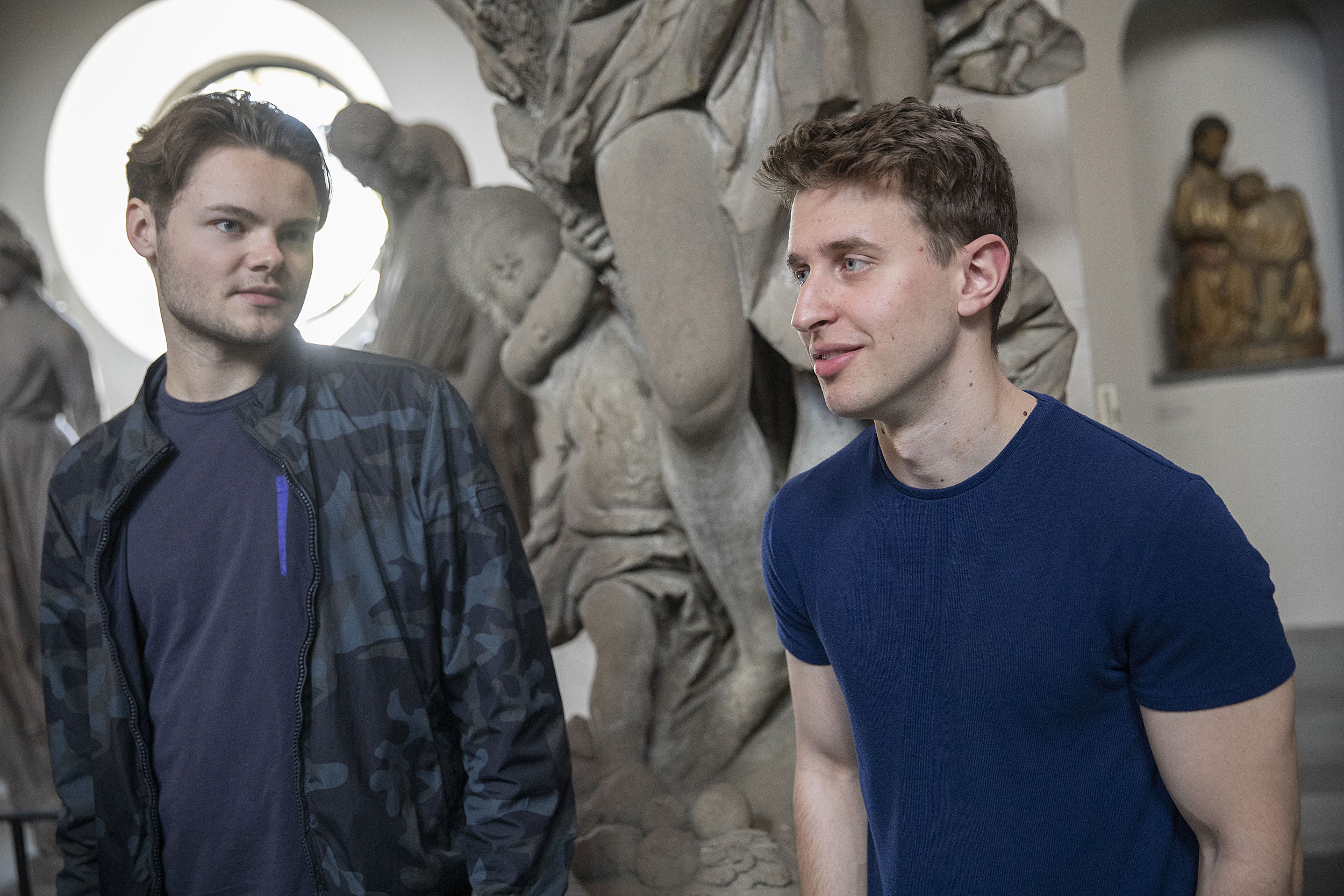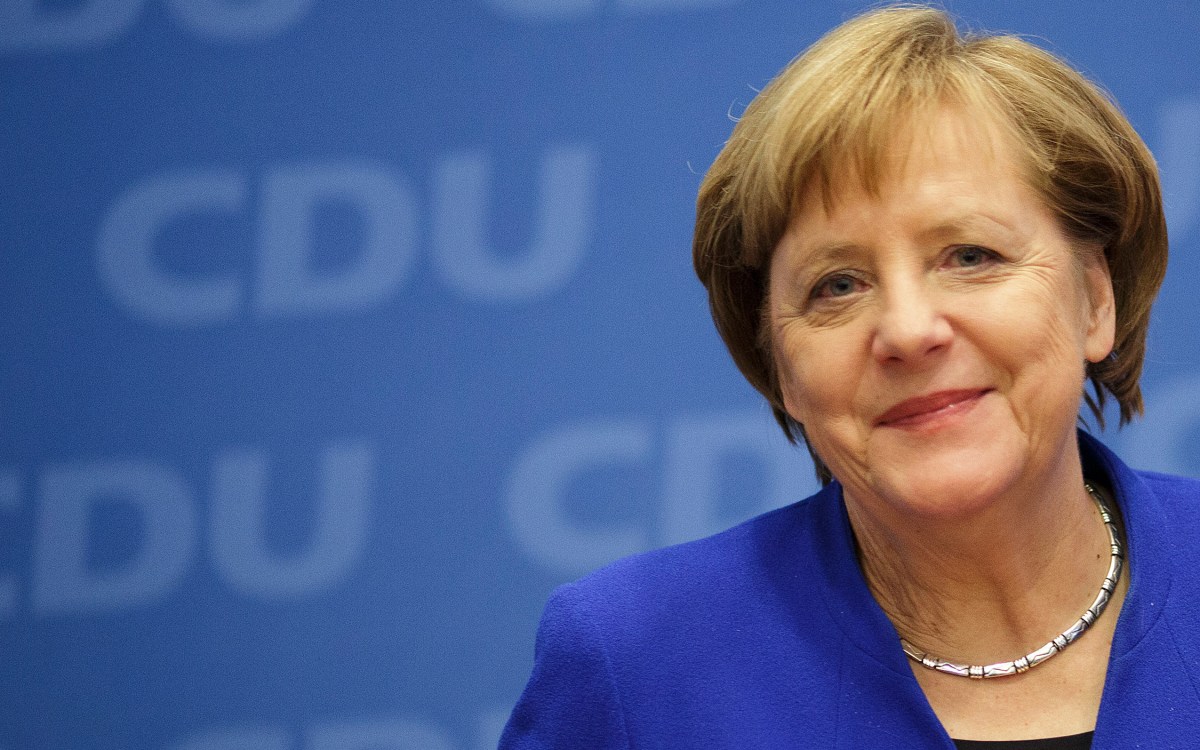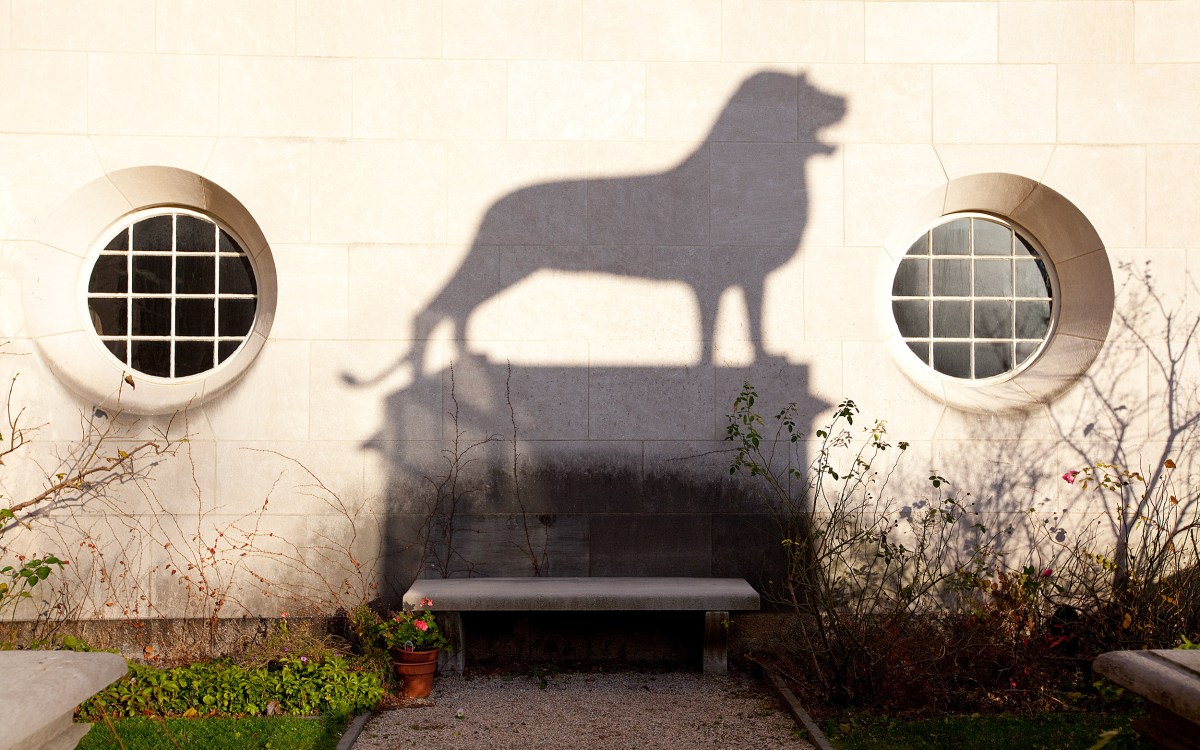
In Adolphus Busch Hall – which housed Harvard’s Germanic Museum — Celina Hollmichel ’19 (from left), David Alexander Paffenholz ’22, Karl Oskar Schulz ’22, and Lara Schenk ’22, Harvard students from Germany, speak about Angela Merkel, the principal speaker at this year’s Commencement.
Kris Snibbe/Harvard Staff Photographer
Generation Merkel at Harvard
Students from Germany, who may barely remember when she wasn’t chancellor, share their thoughts as she visits
When German Chancellor Angela Merkel steps down in 2021 after 16 years, she’ll have been in the job longer than any other leader in the European Union. During that time, a generation of Germans will have grown up knowing mostly only her as leader. They are often called Generation Merkel or the Merkel Generation. The Gazette spoke with a number of German students studying at Harvard, in advance of her visit as Commencement speaker.
The German students at Harvard come from major cities such as Berlin, Frankfurt, and Düsseldorf, and from smaller municipalities such as Oeding and Hanover. Many were in grade school when Merkel came to power. Others were young teenagers without a vested interest in politics. Now, looking back at her tenure, they reflect on her abiding and often reassuring presence.
A national constant
“German living is synonymous with Merkel as chancellor,” said Isaiah Michalski, a Harvard College sophomore from Berlin. He was 7 when Merkel took office. “Every election … it seemed somehow natural that she would win again.” That seemed so natural that in a recent conversation, he continued, all of his German friends came to the same conclusion about 2021: “It is a strange, strange feeling, the idea that she could not be chancellor.”
Lara Schenk, a first-year student from Hanover, had a similar take. “I wouldn’t associate any other person with [the chancellorship],” said Schenk, who plays soccer for Harvard. “It’s just been Merkel since I was born, basically, or since I can remember having a leader or listening to the news.”
Schenk was 5 when Merkel took power. “It didn’t seem weird to me at all until I started looking at different countries when I was a bit older — like in high school when you start broadening your spectrum of looking at politics. I noticed it’s not like that in all countries where you have the same leader for 14 years.”
Still, the subject isn’t something Schenk or her friends generally talk about, she said, because they’ve has grown so accustomed to Merkel. Generation Merkel is not a term with which they identify.
“For us, it’s not that big of a deal,” Schenk said. “It’s cool thinking about it now when you’re outside the country and when there’s the potential of her stepping down. That’s only really when you notice how big a deal it is.”

“Seeing a woman in such a leading role has really influenced me,” said Celina Hollmichel (left), standing with Lara Schenk.
Kris Snibbe/Harvard Staff Photographer
Enduring stability during crisis
In a country that became whole again only 30 years ago, Merkel has not only come to symbolize a national constant, but has given Germans a sense of security, many of the students said, even during times of crisis.
“Everything seems very stable when she’s talking” said Karl Oskar Schulz, a first-year student who was 5 when Merkel became chancellor. Schulz works as a program assistant at Harvard’s Minda de Gunzburg Center for European Studies and as a John F. Kennedy Jr. Forum committee member at the Institute of Politics at Harvard Kennedy School (HKS).
“Growing up, everything always seemed to be all right,” Schulz said.
A big contribution to this was Merkel’s calm demeanor in challenging situations and the pragmatic steps she took to handle them, such as during the worldwide financial crisis of 2007‒2008 and when she methodically worked to negotiate a ceasefire between Russia and Ukraine in 2015.
“From my perspective, there’s real appreciation about her style of dealing with crises and her level of diplomacy,” said Isabel Schünemann, who was 18 when Merkel was first elected.
Schünemann is part of the McCloy German Scholars Program, which brings German students to HKS to study in one of its degree programs.
Schünemann said she likes that Merkel is “the quiet person in a room full of people” and appreciates how she avoids emotional distractions in making decisions. Merkel doesn’t make a statement just to make it, Schünemann said, maintaining that she is looking for a good solution, not just what’s best for her public image.
“It’s the opposite of Donald Trump,” Schünemann said. “For her, we don’t know exactly what’s happening behind the scenes, but she’s having talks with everyone. It’s less about media attention and the public and polarization and making big statements; it’s more about, ‘Let’s calm things down. Let’s figure it out [and] bring people together.’ ”
An episode each student mentioned was Merkel’s actions during the 2015 European migrant crisis, when Germany opened its borders to about a million refugees, many of them escaping wars and poverty in Syria, Afghanistan, and other parts of the Middle East and Africa. The period is often referred to as a defining moment in terms of the chancellor’s legacy, in both negative and positive contexts. Germany is still dealing with its ramifications.
For David Alexander Paffenholz ’22, Merkel’s response to those times increased his admiration of her.
“She was able to keep our country largely together,” Paffenholz said. “She demonstrated to the world that Germany would be willing to take a strong stance in the refugee issue, take in many refugees, and do the best we could to support them.”
It wasn’t perfect, he admitted — there were issues with implementation and logistics — but the move reflected a strong moral position, he said. “It wasn’t the game of a politician she was playing there, but rather a really moral action.” Paffenholz followed Merkel’s example. For more than a year, he worked with a refugee family at a local shelter in Düsseldorf to help them understand official government documents, learn German, and integrate into German society.
The issue was personal for Michalski, too — his family took in a Syrian refugee. “He’s kind of like my older brother now,” Michalski said.
He remembers worrying as members from Merkel’s party, the Christian Democratic Union (CDU), turned against the migrants as the nation started to feel the strain of the influx — yet he felt reassured by Merkel.
“It was almost always calming to know that Merkel had this unique quality of navigating the conservatives who were anti-refugee while still holding onto the human rights point of view and being able to create an open Germany with open borders,” he said.

“Everything seems very stable when she’s talking” said Karl Oskar Schulz (right), who was 5 years old when Merkel became chancellor.
Kris Snibbe/Harvard Staff Photographer
National pride
Poignant moments like these have brought a sense of national pride to many Germans, said Jan Philip Petershagen, a visiting undergraduate student studying business administration who is from Münster and was 7 in 2005.
“She’s had quite an impact on the world,” Petershagen said. “As a German citizen, I’m very proud of what she has achieved. [Having been] in other countries, I think Merkel is very well recognized as the leader of Europe through her pragmatism and through her ability to compromise with all people. She has kind of given Germany … a new image and identity toward the outer world that I appreciate.”
That image, Petershagen and others said, stands in opposition to the nation’s past as an aggressor in two world wars.
“I think it’s always difficult for Germans, given our history, to have that outward pride of our country,” said Paffenholz. “I think she’s been key in continuing to bring Germany forward to a state where we can be proud of our country and the actions we take. In that way, I really do identify Germany with her and especially our stance in the world. I think that really speaks to the development Germany has gone through in the past decades toward the promising situation we’re in now.”
Despite their pride, some students voiced a few common criticisms of Merkel. Chief among them was that the chancellor lacks a true political vision for Germany or Europe and that the compromising approach and calm demeanor for which many praised her is not compelling to young Germans.
“She’s not very engaging and not very inspiring,” said Schulz, the first-year who works at the Center for European Studies and the Institute of Politics. Schulz believes Merkel is still one of the best chancellors Germany has had, but suggested that her not motivating young Germans may have led many to be uninterested in politics.
“I don’t know if you can just blame that on Angela Merkel,” Schulz said. “But I think that if you have a leader who is very calm and never really changes anything and doesn’t really engage in debates, you get a generation of people who are not really interested.”
Celina Hollmichel, a first-year from Berlin, had a different take on Merkel as role model.
“Seeing a woman in such a leading role has really influenced me,” Hollmichel said. “Even just subconsciously, it’s never been a question whether a woman can lead a state, in our case, because it’s always been a given fact for me. That has influenced how I went on to do things and always went for leadership positions if I thought I would be interested in it. I thought, ‘Oh well, I have the right to.’”
She also holds up Merkel’s scientific background as inspiring, since she holds a degree in physics and physical chemistry from the University of Leipzig and a doctorate in quantum chemistry from the German Academy of Sciences.
“She goes against any gender stereotypes,” Hollmichel said.
A ‘new wind is blowing’
Still, Hollmichel and the others agreed that it is time for change in Germany. Ultimately, it is good for the nation that Merkel is stepping down, they said.
“It’s a healthy road for democracy to allow new voices to come up and new people to be in power,” said Michalski.
Schenk, the first-year soccer player from Hanover, hopes the transition of power is smooth and leads to a change from what she considers “slightly outdated views.”
“I think there’s a new wind blowing in Germany,” she said.
Kai Dittmann, a John F. Kennedy Fellow who grew up in Lüneburg, was 17 when Merkel became chancellor and is a member of Germany’s Social Democratic Party, the CDU’s main opposition. “I think we should think about term limits,” said Dittman. “There is a problem with the [government] structure and the mindset of voters, including Generation Merkel, if it becomes so that the chancellorship almost becomes synonymous with a person. You think of that person as a natural chancellor. It might be problematic, especially if you are less happy with the chancellor.”
Still, he doesn’t deny what Merkel has accomplished during her tenure.
“A lot of people from my party consider her as a chancellor who brought Germany to where it is now,” Dittman said.







